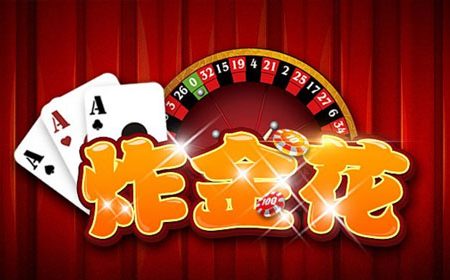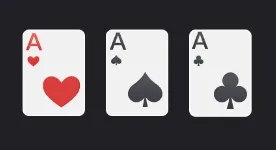


“three card poker” is also known as “Win Three Cards” or “Zha Jin Hua” and is a widely popular folk game with unique card comparison rules. It is a strategic card game that tests intelligence and courage, and many people are fascinated by it! The key gameplay is simple and easy to understand, allowing players to quickly get the hang of it. Let me introduce this game that tests your courage and intelligence.
The game is played with 2-5 players using a deck of 52 cards. Ante: Before dealing the cards, all players at the table need to pay the ante. Determining the banker: A random player is chosen as the banker for each round. Dealing: Starting from the banker in a counterclockwise direction, each player receives three cards face-down. Betting: Betting starts from the player next to the banker. In the first round, players can choose to see their own cards, follow the bet, raise the bet, or fold. Seeing cards: Players can choose to see their own cards at any time. Once seen, the cards are open. After seeing the cards, players can choose to follow the bet, raise the bet, or compare cards. Betting, raising, and comparing cards are done based on open cards. Players can also choose to play with closed cards. Following the bet: Following the previous player’s bet amount. If both players have closed cards, they need to pay the same amount to follow. If the previous player has open cards, the player needs to pay half the amount to follow. If the player has open cards and the previous player has closed cards, the player needs to pay double the amount to follow. If both players have open cards, the player needs to pay the same amount to follow. Raising the bet: Each player can only raise the bet once per round, up to the maximum chips allowed in the game room. Folding: Players who fold during the game are out for the current round and can either wait for the round to end or start the next round immediately. Comparing cards: From the second round onward, players can choose to pay double the chips and compare their cards with any player on the table. All players cannot see the cards of the players involved in the comparison. In the case of the same ranking of card types, the player who initiated the comparison loses. Number of rounds: The maximum number of rounds is set at 15. When it reaches the maximum number, starting from the player next to the banker, each player is forced to initiate a comparison with the next player until only one player remains.
Auto-fold for timeout: By default, if a player does not take action within the time limit during the first three rounds and has a straight or higher-ranking hand, the player automatically follows. Otherwise, the player folds. Starting from the fourth round, if a player with an open card times out, the system will automatically initiate card comparisons in a counterclockwise order for players with straight or higher-ranking hands. If the player has a hand lower than a straight, they fold. If this feature is unchecked, it remains unchecked for subsequent rounds unless a player doesn’t have enough chips, in which case they fold. Auto-fold for insufficient chips: If a player doesn’t have enough chips to meet the bet or follow amount during a round, the system will fold the player’s hand. Forced comparison for insufficient chips: If at the start of a round one player doesn’t have enough chips to meet the next follow amount, the system will force all players to participate in a comparison in the order of play for that round. The player who wins the comparison becomes the winner of that round.

The hand rankings from highest to lowest are: “豹子” (Three of a Kind) > “順金” (Straight Flush) > “金花” (Flush) > “順子” (Straight) > “對子” (Pair) > “散牌” (High Card). Card values: From lowest to highest: 2, 3, 4, 5, 6, 7, 8, 9, 10, J, Q, K, A. Suits do not affect card values. For “順金” and “順子” hand types, they are compared based on card values in the sequence QKA > JQK > … > 234 > A23. Note: KA2 is not considered a straight. Suits do not affect the comparison. In the case of equal hand rankings, the player who initiated the comparison loses.

Pair hand type: First compare the pair value, and if equal, compare the remaining single card values. Suits do not affect the comparison. In the case of equal hand rankings, the player who initiated the comparison loses. High Card hand type: First compare the highest card values of both hands. If they are equal, compare the second highest card values, and so on. If all three cards have the same values, suits do not affect the comparison. In the case of equal hand rankings, the player who initiated the comparison loses. Special case: If no player has a “豹子” hand type, the hand rankings are determined based on the single card values. When a “豹子” exists, special hand types > “豹子”, with “235” being the winning hand. (For example, different suits of 235 > “豹子”).